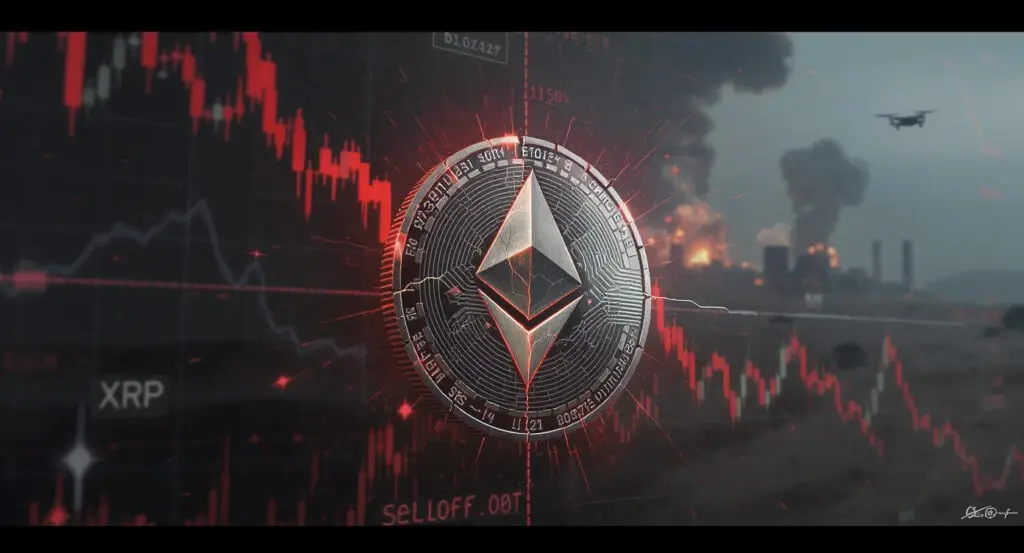The cryptocurrency market reacted swiftly to the news that U.S. bombers had attacked Iran’s three main nuclear sites, as announced by President Donald Trump. Ether, the second-ranked token by market capitalization, experienced a sharp decline, falling as much as 7.7% on Sunday morning in Asia to approximately $2,200. This marked its lowest intra-day level since May 9, though it managed to trim some of those losses later in the day. In contrast, Bitcoin briefly dipped below $101,000 but remained almost unchanged by 1:10 p.m. in Singapore, highlighting a notable divergence in how the two leading cryptocurrencies responded to the geopolitical shock, particularly as traditional markets were closed.
Crypto Reacts as Traditional Markets Pause
With traditional financial markets largely closed over the weekend, the cryptocurrency market became the primary arena for an immediate reaction to the escalating geopolitical tensions. The rapid price movements in both Ether and Bitcoin underscored the crypto market’s inherent sensitivity to major global events, acting as an early indicator of investor sentiment. This immediate response from digital assets, in the absence of traditional market activity, highlights their unique position as a 24/7 global trading venue, often serving as a barometer for risk appetite in times of uncertainty, influencing investor perceptions across various asset classes.
Nervousness and Key Levels to Watch
Caroline Mauron, co-founder of Orbit Markets, a prominent provider of liquidity for crypto derivatives, noted that “Markets are nervously eying ongoing geopolitical developments.” She advised traders to closely monitor key price levels, specifically $100,000 for Bitcoin and $2,000 for Ethereum, as the weekend progressed. Furthermore, Mauron emphasized that once traditional markets reopen, particular focus will shift to oil prices, indicating the broader interconnectedness of global financial systems and how commodity markets are also expected to react to the confirmed U.S. strikes.
Targeted Strikes on Iran’s Nuclear Sites
The direct cause of the market’s jolt was President Trump’s confirmation that U.S. forces had struck three major Iranian nuclear sites: Fordow, Natanz, and Isfahan. Trump’s explicit description of a “payload of BOMBS” dropped on Fordow, a site of significant international concern due to its uranium enrichment activities, underscored the seriousness of the military action. The targeting of these facilities, particularly Fordow, which has long been suspected of being involved in the creation of nuclear weapons, intensified global anxieties and directly contributed to the risk aversion observed in cryptocurrency markets.
Selloff Driven by Geopolitical Overhang
Cosmo Jiang, general partner at Pantera Capital Management, suggested that the market’s downturn through the week and into the weekend was significantly influenced by the “overhang of whether the US would strike Iran.” This implies that the anticipation of a military action had already begun to price in risk before the actual announcement. Jiang further noted that with the strikes now confirmed and a potential “resolution closer at hand,” cryptocurrency prices appear to have found at least a local bottom, suggesting that the immediate, fear-driven selloff might be subsiding as some clarity emerges.
Massive Crypto Liquidation Wave
The geopolitical events triggered a massive liquidation event across cryptocurrency markets. Over the last 24 hours, approximately $679 million in total crypto bets were liquidated, indicating a significant unwinding of leveraged positions. A substantial portion of this, nearly $554 million, comprised long positions (bets on price increases) being closed, while $67 million in short positions (bets on price decreases) were also liquidated, according to data compiled by Coinglass. This extensive liquidation reflects the immediate and severe financial impact on traders caught on the wrong side of the sudden market movements caused by the geopolitical news.
Bitcoin’s Role in Geopolitical Uncertainty
Despite the broader crypto selloff, Bitcoin demonstrated relative resilience compared to Ether, briefly dipping but quickly stabilizing. Cosmo Jiang of Pantera Capital highlighted that in times of geopolitical uncertainty, Bitcoin “tends to lead the market out of a bounce.” This observation suggests that some investors might view Bitcoin as a more robust store of value or a “safe haven” asset within the crypto space during periods of global instability. Its ability to hold steady while other altcoins experienced sharper declines reinforces its position as a primary indicator for market sentiment during crises, attracting capital that might otherwise flow to traditional hedges.
Navigating a Volatile Landscape
The events of Sunday morning underscore the highly volatile and interconnected nature of the cryptocurrency market, particularly its sensitivity to geopolitical developments. As investors nervously eye ongoing situations, exemplified by the U.S. strikes on Iran, the focus remains on key support levels for major cryptocurrencies. The sharp, immediate reactions seen in Ether and Bitcoin highlight the critical need for traders to remain vigilant and adaptable, as external events can trigger rapid price swings, demanding a nuanced understanding of global dynamics beyond just on-chain metrics, fundamentally reshaping risk assessment for digital assets.























